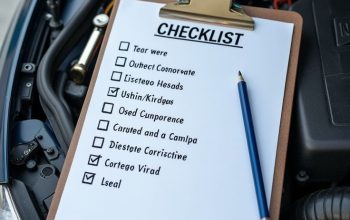Van Maintenance: A Complete Guide to Keeping Your Van in Top Shape
Owning a van is a great investment, whether for personal use, business, or travel. However, like any vehicle, regular maintenance is essential to ensure safety, efficiency, and longevity. Proper maintenance not only prevents costly repairs but also improves performance and fuel efficiency. This guide covers everything you need to know about van maintenance, from routine checks to long-term care.
1. Regular Oil Changes
Engine oil lubricates the moving parts of your van’s engine, reducing friction and preventing excessive wear. Over time, oil breaks down and becomes less effective, leading to engine damage if not replaced. It is recommended to:
- Change the oil every 5,000 to 7,500 miles (check your owner’s manual for specific intervals).
- Use the correct oil type for your van’s engine (synthetic or conventional).
- Replace the oil filter during every oil change to keep the oil clean.
2. Checking and Maintaining Tires
Your van’s tires play a critical role in handling, fuel economy, and safety. To keep them in good shape:
- Inspect the tread depth regularly and replace tires when the tread is worn beyond safety levels.
- Balance and align wheels if you notice vibrations or uneven tire wear.
3. Brake System Inspection
Brakes are vital for your safety, so regular inspections are necessary:
- Listen for squeaking, grinding, or unusual noises, which may indicate worn-out brake pads.
- Check brake fluid levels and top up if necessary.
- Inspect brake lines and rotors for any signs of wear or leaks.
- Replace brake pads before they wear down completely to prevent costly rotor damage.
4. Fluid Checks and Replacements
Various fluids keep your van running smoothly. Regularly check and top up the following:
- Coolant: Prevents overheating and should be checked at least every 6 months.
- Transmission fluid: Ensures smooth gear shifting and should be replaced every 30,000 to 60,000 miles.
- Brake fluid: Needs replacement approximately every 2 years to maintain braking efficiency.
- Power steering fluid: Helps with smooth steering and should be refilled if the steering feels stiff.
- Windshield washer fluid: Essential for clear visibility, especially in bad weather.
5. Battery Maintenance
A well-maintained battery ensures your van starts reliably and powers electrical components effectively.
- Check battery terminals for corrosion and clean them if necessary.
- Test the battery before long trips to avoid unexpected breakdowns.
- Replace the battery every 3-5 years or when it shows signs of weakness.
6. Inspecting the Lights and Electrical System
Your van’s lighting system is crucial for visibility and communication with other drivers.
- Check headlights, brake lights, and turn signals regularly.
- Replace any burnt-out bulbs immediately.
- Inspect electrical wiring for signs of wear or loose connections.
- Ensure that dashboard warning lights are functioning properly and address any alerts immediately.
7. Suspension and Steering System Checks
A healthy suspension system ensures a smooth ride and stable handling.
- Watch out for unusual noises, vibrations, or uneven tire wear.
- Inspect shock absorbers and struts for leaks or damage.
- Schedule an alignment check annually or if the van pulls to one side.
8. Air Filters and HVAC System Maintenance
A clean air filter improves engine efficiency and fuel economy.
- Replace the engine air filter every 15,000 to 30,000 miles.
- Clean or replace the cabin air filter regularly for better air quality inside the van.
- Ensure the air conditioning and heating systems are working properly, especially before seasonal changes.
9. Exhaust System Inspection
A well-maintained exhaust system reduces emissions and improves engine performance.
- Listen for unusual noises or rattling, which could indicate a leak or loose components.
- Inspect the exhaust pipe for visible rust or holes.
- Get a professional check-up if you notice a decrease in fuel efficiency or excessive exhaust fumes.
10. Keeping the Van Clean and Rust-Free
Regular cleaning not only keeps your van looking good but also prevents damage.
- Wash the exterior regularly, especially in winter to remove road salt that causes rust.
- Clean the undercarriage to remove dirt and grime.
- Wax the van periodically to protect the paint and finish.
- Clean the interior, vacuuming seats and carpets to prevent wear and tear.
11. Seasonal Van Maintenance Tips
Each season presents unique challenges for your van. Here’s what to check:
- Winter: Ensure antifreeze levels are adequate, check the heater, and keep an emergency kit.
- Summer: Inspect the air conditioning system and coolant levels to prevent overheating.
- Rainy seasons: Replace windshield wipers and ensure all lights are functional.
12. Scheduled Professional Inspections
While routine DIY maintenance is essential, professional inspections can help identify hidden problems.
- Schedule a full service check-up annually.
- Have a mechanic inspect the engine, transmission, and suspension systems regularly.
- Follow the manufacturer’s recommended maintenance schedule to prevent major breakdowns.
Conclusion
Proper van maintenance not only extends the lifespan of your vehicle but also ensures safety, reliability, and cost savings. Regular checks, timely replacements, and professional inspections will keep your van running smoothly for years to come. By following this guide, you can prevent unexpected breakdowns and enjoy worry-free driving. Whether you use your van for business, travel, or everyday commuting, a well-maintained vehicle is always a smart investment.




